As a pest control expert with over three decades of experience battling these destructive insects, I’ve seen the havoc termites can wreak on unsuspecting homeowners.
But fear not! This guide equips you with the knowledge to tackle termites, combining the power of DIY solutions with the expertise of pest control workers.
Whether you suspect a lurking infestation or want to fortify your defenses, this comprehensive resource will be your termite-battling bible. Let’s delve into the world of termite treatment, exploring both home solutions and professional solutions to keep your home safe and sound.
Identifying a Termite Infestation
Understanding the enemy is key! Here’s how to spot signs of a termite problem:
- Mud tubes: Subterranean termites build mud tunnels on foundation walls or crawl spaces to access wood.
- Discarded wings: Look for piles of tiny wings near windows or doors, shed by swarmer termites.
- Hollow-sounding wood: Tapping on wood that sounds hollow could indicate termite activity within.
- Door sticking: Warped doors or windows can be a sign of structural damage caused by termites.
Types of Termites:
The two main termite culprits are:
- Subterranean termites: These live underground and build mud tubes to reach your home.
- Drywood termites: They nest within wooden structures and don’t require soil contact.
Join the pack of responsible pet owners! Start safeguarding your backyard with pet-friendly pest control today.
Home Remedies to Get Rid of Termites
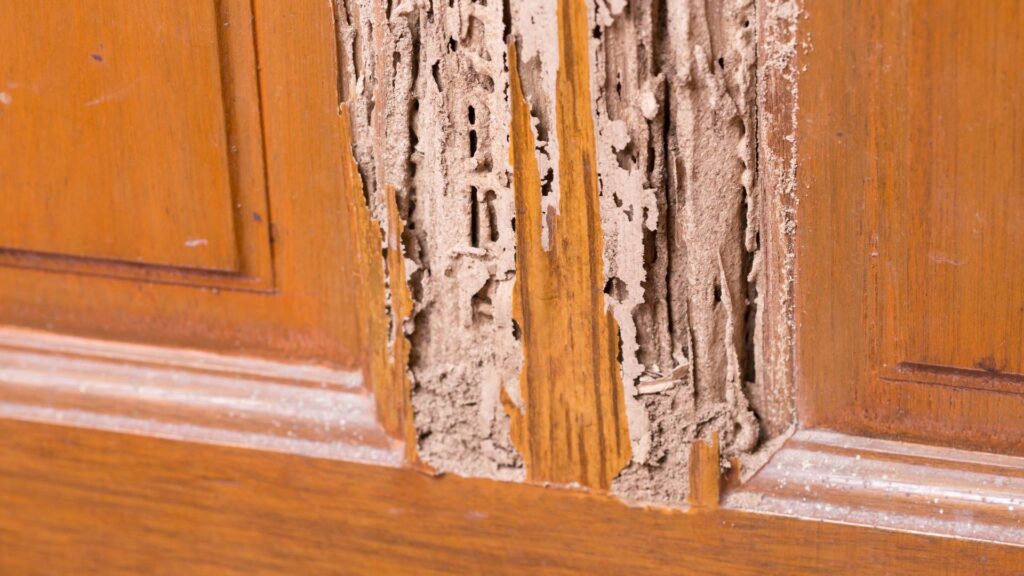
While DIY solutions may not be a magic bullet for wiping out a full-blown termite invasion, they can be a powerful tool in your early detection and prevention arsenal. Here’s a breakdown of some effective methods, along with how to apply them safely and effectively:
Natural Deterrents: Neem Oil
- The Power of Neem: Neem oil, extracted from the neem tree, boasts natural insect repellent properties. While it won’t eliminate existing colonies, its odor can deter termites from targeting your home in the first place.
- How to Use It: To create a neem oil spray, mix a few tablespoons of neem oil concentrate with a gallon of warm water. Add a few drops of mild dish soap to help the oil mix with the water. Apply this solution generously around your foundation perimeter, focusing on areas where termites might enter, like cracks or gaps. Reapply the neem oil spray every few weeks, especially after heavy rainfall.
- Important Note: Neem oil can be irritating to the skin and eyes. Always wear gloves, eye protection, and long sleeves when applying neem oil spray.
Don’t wait for pests to take over! Protect your furry friend and your backyard by exploring our dog-safe solutions now.
Targeted Treatments: Boric Acid
- Desiccant Power: Boric acid is a natural mineral that acts as a desiccant, meaning it dries out insects like termites. When used with caution, it can be effective for targeted treatments of small infestations.
- Application Methods: There are two main ways to utilize boric acid for termite control:
- Termite Dust: Purchase boric acid powder at a hardware store. Wear a dust mask and eye protection to avoid inhalation. Carefully puff the powder into cracks and crevices around your foundation, focusing on areas where you suspect termite activity.
- Termite Stations: These pre-made stations contain boric acid bait that attracts termites. Place stations strategically around your property, following the manufacturer’s instructions.
- Safety First: Boric acid can be harmful if ingested. Keep it out of reach of children and pets. When using boric acid powder, wear gloves and a dust mask to avoid inhalation.
Moisture Control: Sealing the Deal
- Moisture Magnet: Termites thrive in damp environments. Eliminating moisture sources around your home is crucial for both prevention and control.
- How to Achieve It:
- Address Leaks: Inspect your foundation for cracks and repair any leaks in pipes or faucets promptly.
- Improve Drainage: Ensure proper drainage around your foundation by grading the soil so water slopes away from your house. Consider installing gutters and downspouts to divert rainwater further away.
- Ventilation is Key: Maintain proper ventilation in crawl spaces to prevent moisture buildup.
Ready for a bug-free backyard oasis? Click here to discover how to keep pests at bay the pet-safe way.
Physical Barriers: Keeping Termites Out
- Seal Up Entry Points: Termites can exploit even the smallest cracks to enter your home. Sealing these entry points is vital for prevention.
- Caulking for the Win: Use a high-quality caulk to seal cracks and gaps in your foundation, around utility lines entering your home, and anywhere else you suspect termites might find a way in.
Remember, these home remedies are most effective for early intervention and as deterrents. For established infestations, seeking professional help is crucial.
DIY Termite Detection and Treatment
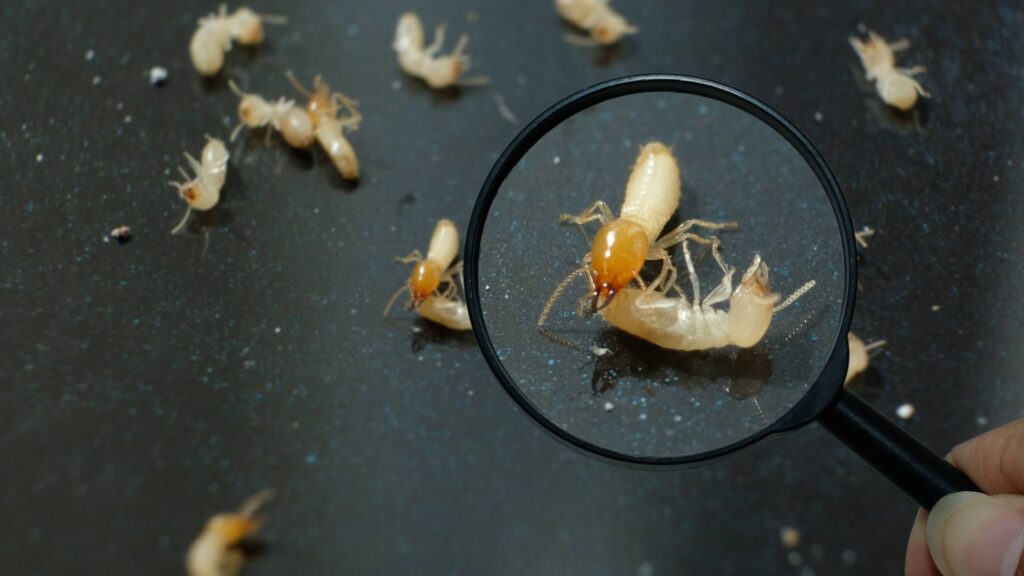
Here’s a step-by-step approach to tackling a suspected termite issue at home:
- Inspect your home: Look for the signs mentioned earlier.
- Set up termite baits: Commercially available termite traps can attract and kill termites.
- Apply natural deterrents: Use diluted neem oil or boric acid solutions (with proper safety precautions) in targeted areas.
Creating a Termite-Proof Environment:
Prevention is key! Here’s how to create a home unwelcome to termites:
- Remove wood-soil contact: Maintain a gap between wooden structures and the soil.
- Store firewood away from the house: Don’t provide a haven for termites near your home.
- Control moisture: Fix leaky faucets and ensure proper ventilation in crawl spaces.
- Use termite-resistant materials: Consider using treated lumber for repairs or renovations.
Transform your outdoor space into a safe haven for your pet. Learn more about our natural and effective pest control methods.
Prevent Termites: Building a Fortress Against Destructive Pests
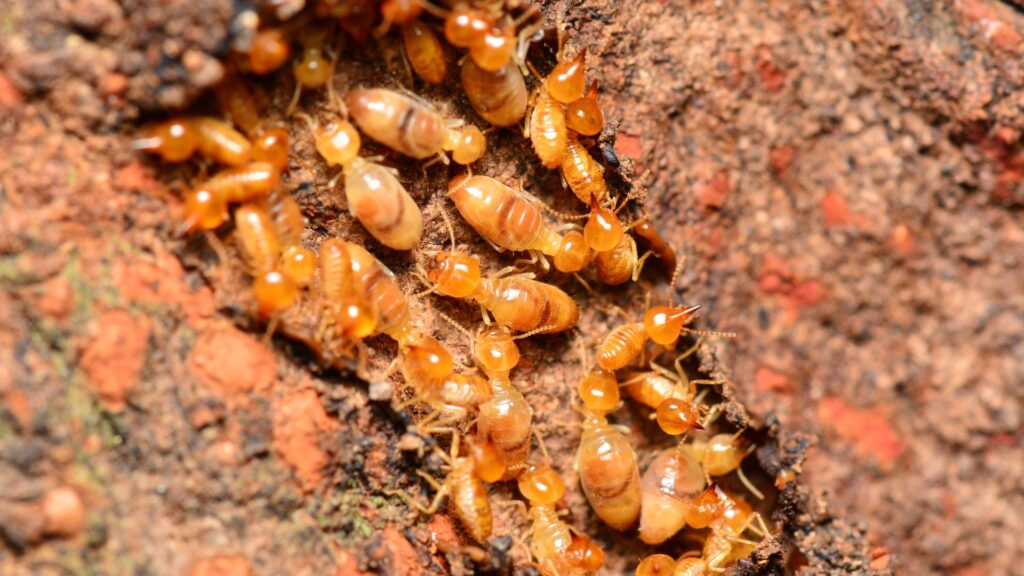
An ounce of prevention is truly worth a pound of cure when it comes to termites. Here’s how to take a proactive approach and transform your home into a fortress against these destructive pests:
- Schedule Regular Inspections: Think of a yearly inspection by a qualified pest control professional as your home’s annual physical. Just like a doctor, they can identify early signs of trouble before they snowball into major issues. Early detection is crucial for successful termite control, and a professional’s trained eye can spot even the subtlest signs of termite activity.
- Create a Termite-Unfriendly Zone: Consider establishing a professional termite barrier around your home’s perimeter. This barrier acts as a frontline defense against subterranean termites, the most common culprits in many regions. The barrier product, applied by a licensed professional, creates a zone in the soil that eliminates or deters termites, preventing them from entering your home.
- Become a Landscaping Pro: The way you landscape around your home can significantly impact its vulnerability to termites. Here are some landscaping tips:
- Maintain a moisture-free zone: Ensure proper drainage around your foundation to avoid moisture buildup, a major attractant for termites.
- Trim those branches: Keep tree branches and shrubs at least two feet away from your house to eliminate termite travel bridges from vegetation to your structure.
- Mulch strategically: Create a barrier between your foundation and mulch by maintaining a gap of at least six inches. Opt for inorganic mulch materials like crushed rock to further deter termites.
- Become Buddies with Borate: Borate is a natural mineral with incredible pest-repelling properties. Consider using borate-treated wood products for repairs or renovations around your home. This adds an extra layer of defense against these unwelcome guests.
Including a termite control system during new house construction can be a cost-effective way to ensure long-term protection from these destructive insects.
Take the first step towards a pest-free, pet-safe backyard. Dive into our guide on eco-friendly pest management now!
When to Call a Pest Control Service for Termite Control
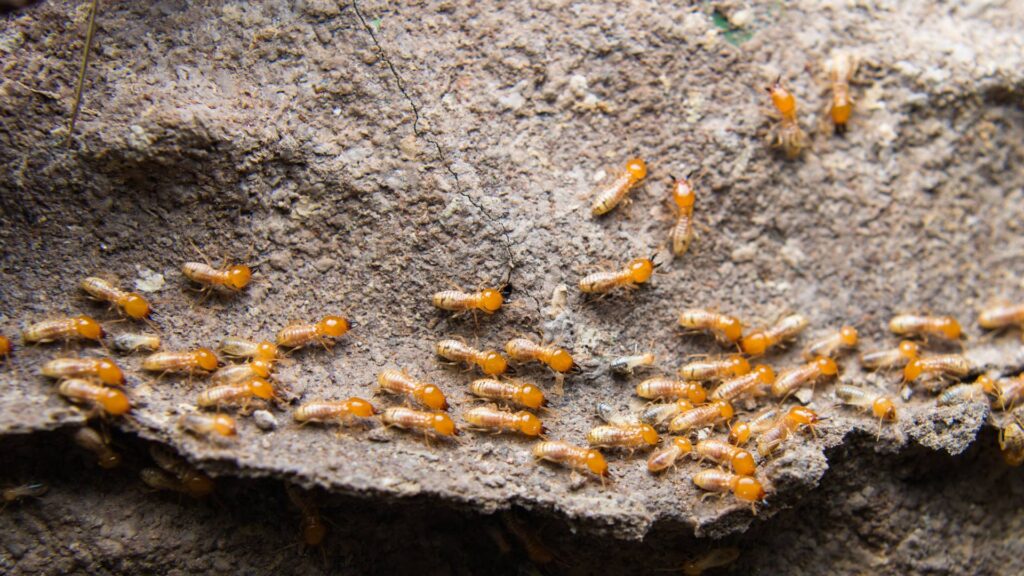
While DIY methods have their place, seeking professional help might be necessary:
- Extensive infestation: If you see widespread damage or large numbers of termites, call a professional.
- Difficulty accessing affected areas: Don’t risk your safety trying to reach hidden termite activity.
- Presence of swarming termites: Swarms indicate a mature colony requiring professional extermination.
The termite cost for a house can vary depending on the severity of the infestation and the treatment method used.
Say goodbye to pests and hello to peace of mind. Check out our top tips for keeping your backyard safe for your four-legged friends.
Balancing Home Remedies and Professional Termite Treatment
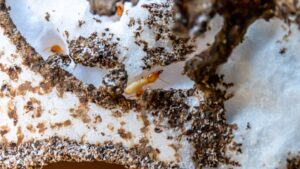
While home solutions can be a helpful first line of defense, remember, I’m a pest control expert for a reason! Here’s why professional intervention is crucial:
For established infestations or long-term protection, calling a qualified pest control professional is the smartest course of action. They possess the knowledge, tools, and experience to effectively eliminate termites and safeguard your home.
Professional inspections can identify early signs of termite activity before they become a major problem, saving you time, money, and the stress of extensive repairs.
Think of home remedies as a helpful starting point, but for true peace of mind, professional termite control is the ultimate weapon in your defense.
Frequently Asked Questions About Best Treatment of Termites at Home
Can I treat my home for termites myself?
Yes, you can treat your home for termites yourself using various DIY methods, such as termite baits, borate wood treatments, and diatomaceous earth. However, for large infestations or structural risks, professional pest control is recommended.
What kills termites instantly?
To kill termites instantly, products containing fipronil or imidacloprid are effective. These chemicals are found in many commercial termite treatments and can quickly eliminate termites on contact.
Your pet’s safety is our priority. Explore dog-friendly pest control options that work—click here to start!
How do you treat termites in the house?
Treating termites in the house involves identifying infested areas, using termite baits, applying chemical treatments to soil and wood, and regularly monitoring for further activity. Ensuring proper ventilation and moisture control in the home also helps in preventing termite re-infestation.




